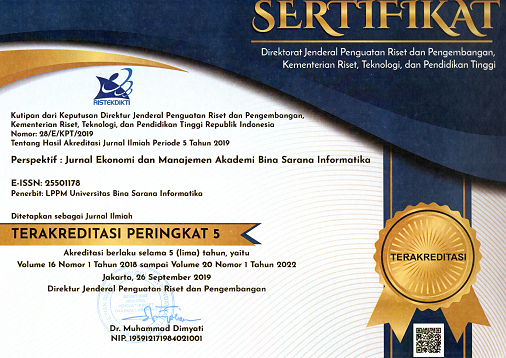Pengaruh Ekonomi Makro SBI, EXR, M2, GDP dan OIL terhadap Inflasi di Indonesia Tahun 2020–2024
Abstract
Keywords: Inflation, interest rate, exchange rate, money supply, oil price, macroeconomy.
Full Text:
PDFReferences
Fisher, I. (1911). The Purchasing Power of Money. New York: Macmillan.
Keynes, J. M. (1936). The General Theory of Employment, Interest and Money. London: Macmillan.
Friedman, M. (1963). Inflation: Causes and Consequences. Asia Publishing House.
Mankiw, N. G. (2018). Makroekonomi (8th ed.). Jakarta: Erlangga.
Tambunan, T. (2020). Perekonomian Indonesia: Beberapa Masalah Penting. Jakarta: Ghalia Indonesia.
Dwi Putra, R., & Saputro, A. (2021). Ekspektasi Inflasi dan Variabel Makroekonomi. Jurnal Ekonomi Indonesia, 10(2), 124–135.
Siregar, H., & Wahyudi, T. (2021). Analisis Pengaruh Variabel Makroekonomi terhadap Inflasi di Indonesia. Jurnal Keuangan dan Moneter, 9(3), 90–102.
Putri, S., Hasan, M., & Indah, R. (2022). Dampak Suku Bunga, Nilai Tukar, dan Harga Komoditas Global terhadap Inflasi di Indonesia. Jurnal Ekonomi Pembangunan, 17(1), 45–59.
Susanti, D. (2023). Dinamika Inflasi Indonesia di Masa Pandemi COVID-19: Peran Faktor Domestik dan Global. Jurnal Ekonomi dan Kebijakan Publik, 12(1), 20–33.
Badan Pusat Statistik. (2024). Indeks Harga Konsumen dan Inflasi. Diakses dari: https://www.bps.go.id
Bank Indonesia. (2024). Statistik Ekonomi dan Keuangan Indonesia (SEKI). Diakses dari: https://www.bi.go.id
EIA. (2024). Petroleum & Other Liquids – Crude Oil Prices. U.S. Energy Information Administration. https://www.eia.gov
Kementerian Keuangan RI. (2024). APBN dan Kebijakan Fiskal 2023. https://www.kemenkeu.go.id
OECD. (2024). Inflation and Economic Outlook: Indonesia 2024. https://www.oecd.org
World Bank. (2024). Global Economic Prospects. Diakses dari: https://www.worldbank.org
DOI: https://doi.org/10.31294/jp.v23i2.27500
Copyright (c) 2025 Elita Lukminarti

This work is licensed under a Creative Commons Attribution-ShareAlike 4.0 International License.
dipublikasikan oleh LPPM Universitas Bina Sarana Informatika Jakarta
Jl. Kramat Raya No.98, Kwitang, Kec. Senen, Kota Jakarta Pusat, DKI Jakarta 10450

This work is licensed under a Creative Commons Attribution-ShareAlike 4.0 International License









